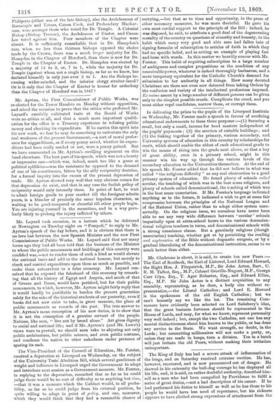In delivering the prizes to the pupils of the Liverpool
Institute on Wednesday, Mr. Forster made a speech in favour of confining educational endowments to these three purposes :—(1) Securing a small, but only a small, income for head masters independent of the pupils' payments ; (2) the erection of suitable buildings ; and (3) the linking together of the primary, various secondary, and University systems of education in this country by scholarships for merit, which should enable the ablest of each educational grade to win the means of rising into the grade next above, so that a boy of great ability, even in a primary school, might in this manner win his way up through the various levels of the secondary education to the Universities themselves. At the end of his speech Mr. Forster added that he did not believe in what was called "the religious difficulty" as any real obstruction to a good primary system of education. He found plenty of schools called secular, the teaching of which was in the best sense religious, and plenty of schools called denominational, the teaching of which was in the best sense unsectarian. If Mr. Forster'a language indicated anything as to the future, it indicated a wish to get at some fair compromise between the principles of the National League and of the National Union, rather than to adopt either system unre- servedly. On the religious issue, we ourselves have never been able to see any very wide difference between 'secular' schools impartially open at extra-school hours to the various denomina- tional religious teachers in turns, and denominational schools with a strong conscience clause. But a genuinely religious (though unsectarian) teaching, whether got at by permitting the reading and explanation of the Bible without dogmatic exegesis, or by a gradual liberalizing of the denominational instruction, seems to us much better than either.


































 Previous page
Previous page